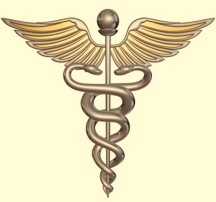A Guide for Physicians
and Other Healthcare Providers
Health Information on the Web
 Health Information on the Web...Is it accurate?
Health Information on the Web...Is it accurate?Where to Find Good Health Information Online
Part of good patient care involves knowing where to find good medical or health information when you need it. We often look to the web for a quick reference on a particular topic. There are literally thousands of websites and blogs related to healthcare and medicine on the Internet. Many of these are valuable resources, but how do you know which ones have the best information, integrity and credentialing?
One way to tell is to look for an icon on the site displaying the HON code (Health on the Net Foundation). If the site is verified by this code, that means it has been reviewed and the site complies with the following rules...
• Authority – Credentialing of the author or moderator is clearly stated. The purpose of the site and those responsible for it are evident.
• Complementarity – The information on the site complements but does not replace the information and/or advice of any health professional.
• Confidentiality and privacy are respected.
• References and valid links to the medical information are provided.
• All posts and updates are dated.
• Users must post only information that is true and correct to the best of their knowledge.
• The rules for posting to the site or blog are clearly accessible on the site.
• Full disclosure of how the site is funded is clearly stated on the site.
• In addition, there will always be a valid email address or contact address where the author can be contacted for questions or further information.
If the healthcare site that you are viewing does not display the HON code icon, it doesn’t necessarily mean that it’s not a reliable site. It may mean that the site never applied for the code. If the logo is displayed, however, you at least know that the site is credentialed and follows the above guidelines.
A small toolbar icon for your browser can be downloaded from the HON site that will show you whether the page you are visiting is verified by the HON code.
You may want to develop your own medicine library online that you can access quickly with a group of bookmarks. These should be the sites that you need to refer to most often and are the most reputable that you can find.
Popular Health Information Websites that Patients Visit
It might be a good thing to look at what your patients are seeing on the web in the way of health information...
WebMD - This is a very common place for patients to visit. The information here is very basic, but it is written in everyday non-medical language that most everyone can understand, which is why people like it. Some of the articles are written by health professionals. some are written by journalists who specialize in healthcare coverage. Most of it appears to be accurate when I have looked at it, although I would caution patients to stay away from the blogs, many of which contain individual anecdotal stories which readers often tend to generalize.
OnHealth (a subsidiary of WebMD) - This site seems to have more detail about many health topics. The articles are apparently written by non-medical reporters, but are reviewed by a network of board certified physicians. The articles that I have read there appear to be accurate and are written well.
Emedicinehealth has a wide range of topics and health news articles with lots of informative photos. It may be more reputable since it stemmed from emedicine.com which was originally a health professional site.
There are a number of consumer health information sites that are associated with very reputable medical centers and institutions like the Mayo Clinic, Johns Hopkins, NIH, CDC and many others, too numerous to mention. Many of these centers publish newsletters containing lots of updated information for patients.
The only problem with patients looking up their own information on the Internet is that most patients don't have the knowledge, background or experience to be able to put this information in perspective. For example, the early symptoms of pancreatic cancer can be the same as those seen in gastroenteritis or gallbladder disease, but patients frequently assume the worst. So many times the information is unnecessarily frightening. Then it is up to the healthcare provider to try to disprove what the patient is convinced they have based on their research.
| | This site complies with the HONcode standard for trustworthy health information: verify here. |
This page was last updated on October 20, 2019.
From "Health Information" to "Health Care Technology"
From "Health Information" to "HomePage"
Disclaimer | Privacy Policy | Copyright | Sitemap | Contact | Comments
















